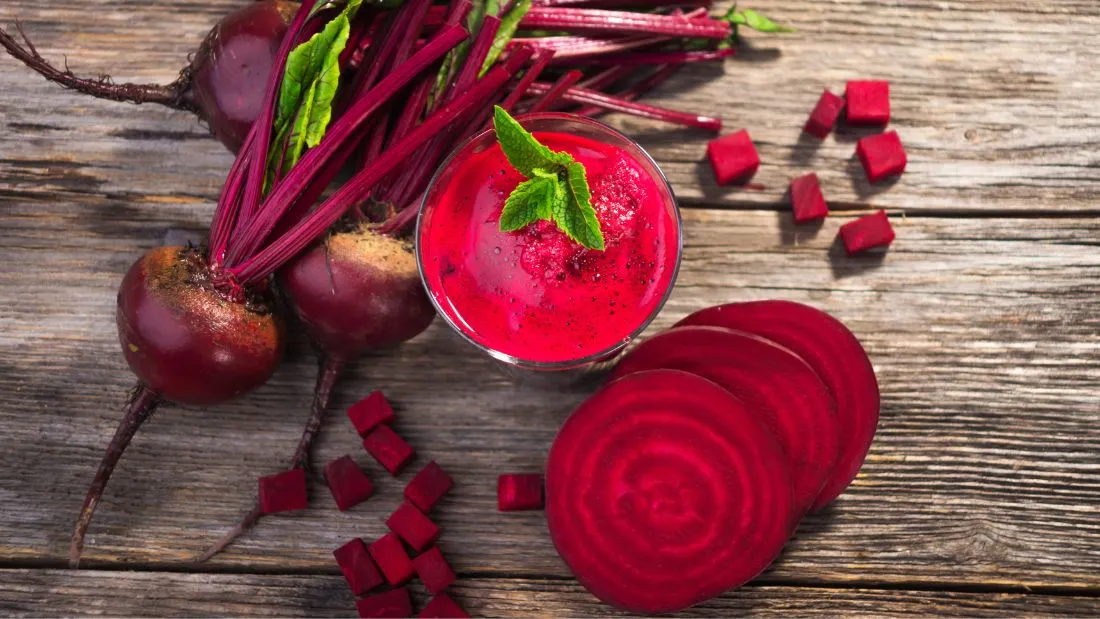Beetroot

Rich in colour and health benefits, beetroot is a true gem among root vegetables.
Beetroot season is quite long – from early summer to autumn – but this tough vegetable keeps well if stored in a cold, dry and dark place, is well-suited to pickling and you can buy boiled and vacuum-packed beetroot all year round.
Nutrition facts
One cooked beetroot, weighing about 50 grams, provides 22 calories, very little fat, protein or carbohydrates but a good dose of folate (vitamin B9) and boron, and small amounts of iron, magnesium, manganese, potassium and zinc.
Folate is essential for red blood cell formation, healthy metabolism and DNA formation, while boron is important for sex hormone formation and balance as well as for for healthy bones.
Iron, magnesium, manganese, potassium and zinc are vital for a healthy immune system, blood formation, nervous system, bone maintenance, body fluid balance, muscle function, energy production and more. Fresh beetroot also contains vitamin C, crucial for the immune system, wound healing and healthy skin and cartilage tissue.
And let’s not forget fibre – beetroot is a good source and that means it keeps your digestive system healthy, feeds the good gut bacteria and by doing so also strengthens your immune system.
On top of that, beetroot contains betaine, a substance that has been found to support treatments for depression. Betaine also helps to lower homocysteine levels in the blood, which is a good thing since high levels are linked to inflammation and an increased risk of cardiovascular disease.
Antioxidants
Beetroot contains strong antioxidants called betalains and these are also what gives the root its intense colour. They prevent cholesterol in your blood from oxidising, which helps to lower your risk of atherosclerosis (hardening and narrowing of the arteries due to cholesterol plaques) and they also have anti-inflammatory effects. Additionally, they also appear helpful for people with osteoarthritis – they can reduce the pain and discomfort this condition typically brings. And research suggests they may also help prevent cancer but more research is needed on this.
Because betalains are such intense pigments, they may turn your urine or stools slightly pink or purple within a few hours of eating beetroot or drinking beet juice. This is completely harmless but worth remembering so you don’t get needlessly concerned about your health!
Another group of antioxidants beetroot offers are phenolic compounds – they protect cells and tissues from damage, are anti-inflammatory and strengthen our own defences too.
Blood vessel dilator
You may have heard that beetroot can help with high blood pressure and it’s true! It’s because it contains nitrates which are converted into nitric oxide in your body, which helps to relax and dilate your blood vessels – improving blood flow and lowering blood pressure.
This effect also helps athletes because wider blood vessels help to bring more blood to working muscles, supplying them with more oxygen and nutrients. Studies show that drinking beetroot juice 30 minutes before training improves stamina and overall performance.
And this same effect also helps to bring more blood into the brain, potentially improving your cognitive skills, such as information processing and memory. However, more research in this area is needed.
Beetroot and IBDs
Unfortunately, because beetroot contains fructans – a type of short-chain carbohydrates – it can cause digestive upset in people with irritable bowel diseases (IBDs). Those who follow the low-FODMAP diet that avoids these types of carbohydrates should avoid beetroot. However, in people who don’t suffer from IBD, beetroot is not only safe to eat but brings many benefits as outlined above.
How to use beetroot
Fresh beetroot is excellent grated in salads or blended in smoothies. Pickled beetroot eaten on its own is a firm favourite with many or you can use it to spice up cooked dishes. You can, of course, also roast beetroot – it enhances its flavour and the result is truly delicious. Boiled beetroot also works great in salads, or you can chop it into stews, soups and risottos, shred it and add to home-made burgers or slice and use for sandwiches. Beetroot purée added to cake batter will produce a beautiful red velvet cake or you can use it as a food colourant in pancakes, ice lollies or cupcakes.
Beetroot juice is a quick and easy way to consume beetroot but it doesn’t have any fibre and usually also no vitamin C, so eating whole beetroot is healthier.
For culinary inspiration, see our Vegan Recipe Club beetroot recipes!
